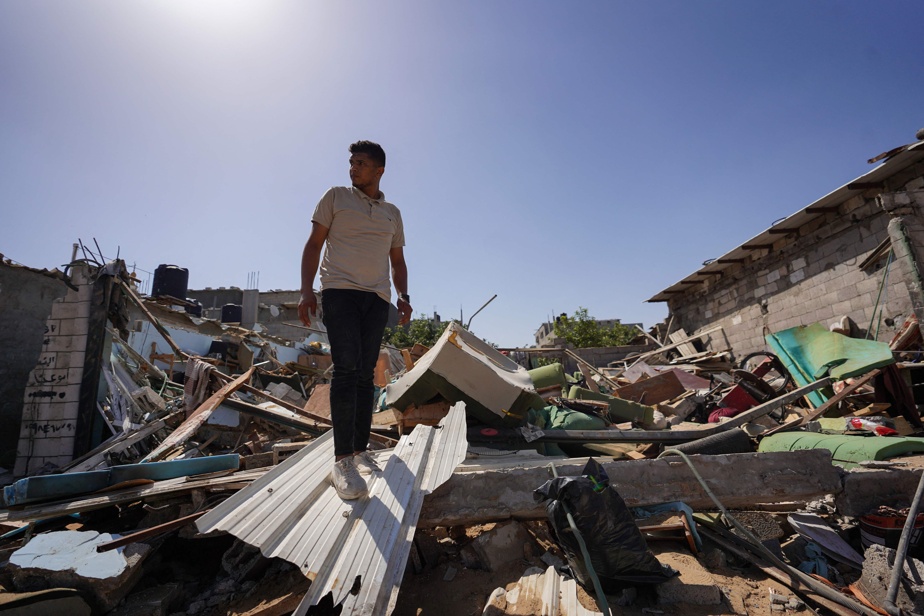The Israeli army carried out deadly bombings on the Gaza Strip on Tuesday, the most violent of which hit Rafah, in the south, and the center of the Palestinian territory devastated by more than eight months of war between Israel and Hamas.
Bombings and fighting have decreased in intensity since the army announced on Sunday a humanitarian pause in an area of the southern Gaza Strip, which coincided with the start of the Muslim holiday of Eid al-Adha.
But in the center of the territory, 13 Palestinians were pulled out before dawn from the rubble of two bombed homes in Nousseirat, according to Civil Defense.
Al-Awda Hospital in Nousseirat announced that it had received six bodies and 15 wounded “after Israeli strikes on several areas of the center and south of the Gaza Strip.”
Bombings targeted the al-Bureij refugee camp and the town of Deir el-Balah, also in the center, and Gaza City in the north, according to witnesses.
All night long, explosions were heard in Rafah, the target of intense artillery fire, according to an AFP correspondent. Fighting was reported in several neighborhoods.
The army announced on Tuesday that it was continuing its operations against the Islamist movement Hamas and its allies.
“For a month now, we have been dismantling Hamas in Rafah,” Israeli government spokesman David Mencer said. “Terrorist outposts in Shaboura and Tal al-Sultan are being defeated. We have eliminated hundreds of terrorists, discovered tunnel entrances,” he added.
The war broke out on October 7, when Hamas commandos infiltrated from Gaza in southern Israel carried out an attack that resulted in the deaths of 1,194 people, mostly civilians, according to an AFP tally compiled from official Israeli data.
Of 251 people kidnapped, 116 are still held hostage in Gaza, of whom 41 are dead, according to the army.
In response, the Israeli army launched an offensive on the Gaza Strip, which has so far left 37,372 dead, mostly civilians, including at least 25 in 24 hours, according to data from the Gaza Ministry of Health. government in Gaza, led by Hamas.
According to Israeli public broadcaster Kan, Israeli military intelligence officials were aware of a September 19 report by wiretapping unit 8200 detailing a planned Hamas attack aimed at taking several hundred hostages in Israel.
Reiterating their call for early elections, thousands of Israelis demonstrated in Jerusalem on Monday against the government’s failure to negotiate a deal that would allow the release of the hostages.
Prime Minister Benjamin Netanyahu, who faces growing criticism, invited relatives of hostages killed in Gaza to a meeting at his residence, several families announced to AFP on Tuesday.
According to a senior Israeli official who requested anonymity, “dozens” of hostages held in Gaza are alive.
Despite the multiple efforts of the mediating countries, the United States, Qatar and Egypt, the prospect of a ceasefire seems distant.
Mr. Netanyahu assures that he will continue the war until the elimination of Hamas, in power since 2007 in the Gaza Strip.
Hamas, considered a terrorist organization by the United States, the European Union and Israel, for its part demands a permanent ceasefire and a total Israeli withdrawal from Gaza.
A plan announced on May 31 by President Joe Biden, initially providing for a six-week ceasefire combined with the release of hostages and Palestinians held by Israel, remained a dead letter.
On Sunday, the army announced that it would observe a daily pause in daytime operations “until further notice” to facilitate the delivery of badly needed humanitarian aid to Gazans.
This break concerns a road section of around ten kilometers going from the Israeli crossing point of Kerem Shalom, at the southern end of the Gaza Strip, to the European Hospital of Rafah, further north.
Kerem Shalom has become the only passage for aid to enter the territory, besieged and threatened with famine, since the Israeli army launched a ground offensive on Rafah in early May and took control of the border post with Egypt.
AFP images show shipments of humanitarian aid at Kerem Shalom, waiting to enter the Gaza Strip.
The war also led to the opening of a front on the Israeli-Lebanese border, where exchanges of fire intensified between Lebanese Hezbollah, an ally of Hamas, and the Israeli army.
Arriving in Beirut after a trip to Jerusalem, Joe Biden’s emissary, Amos Hochstein, deemed a de-escalation between Israel and Hezbollah “urgent”, speaking of a “serious situation”. The United States wants to avoid “a full-scale war,” he said.




